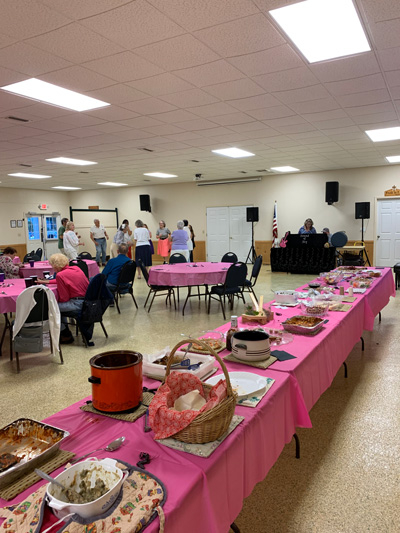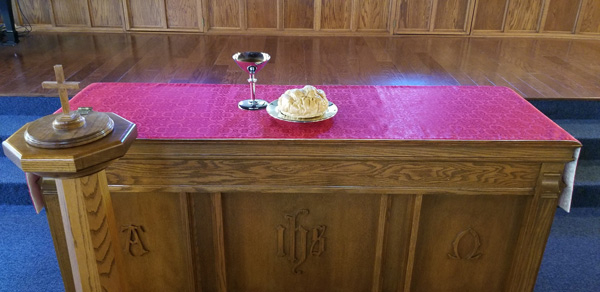‘Christians are not in bondage to do things as the world does, and moreover,
the traditions and rudiments of men are not necessary to honor God.”
Our community of faith gathers to worship each Sunday morning and at 10 am and at other times throughout the year for special celebrations specific to days and seasons. Our worship tends to be “traditional,” in the sense that it does not necessarily match the gatherings “of the world.” At the same time, rites and rituals that may have lost their meaning in contemporary culture are not practiced “just because we’ve always done it that way.” Worship is organized around elements of praise, confession, proclamation and response. Our music is not driven by the fads of the day, nor the jingoistic lyrics befitting of a television or radio advertisement. It reflects verse and tunes that may have been created over 2000 years ago or 20 days ago. Our prayers are both ancient and contemporary. Proclamation is as old as the Scriptures upon which it is based, yet is totally reliant upon the Spirit’s presence to give us God’s word for today in language understandable to each of us. We respond to God’s grace through our offerings and the celebration of two ancient practices of the church, the Lord’s Supper and Baptism. All of this takes place in a beautiful historic sanctuary, a building that in itself and its architecture speak of reverence and praise to God, while creating a space to meet God intimately.

Richard Foster has described spiritual growth or faith formation in not in terms of a linear progression as moving from one point on a line to another, but in terms of a helix like that picture above. As one grows spiritually, the directionality is not so important as the recognition that we find ourselves at different, not necessarily more or less advanced places on the same helix. The helix, being three dimensional, spins without direction up or down, backwards or forwards. Where one finds themselves on the helix does not translate to good or bad, more or less advanced, closer to God or further apart. It simply means one is on a common journey with others. In our effort to provide for individuals’ faith to form organically, we offer a variety of experiences and opportunities to use our intellect and our emotions.
At one time, the church was a primary means of providing fellowship in the community. The days of barn dances and socials have been replaced by a myriad of activities that feed us socially that are no longer related to the church. Never-the-less, the church still provides a place for meaningful relationships and fun. We still gather monthly for meals. The Presbyterian Women have quarterly gatherings with a variety of themes and speakers. After the “snow birds” fly away, we have an annual fourth of July picnic/cookout and our annual “Sloppy Joe Feast.” Our young people gather several times per month for fellowship and our younger children gather around special events at the holidays. We have groups that play Mah Jong together. If we have learned anything from the COVID crisis, we have learned how important providing opportunities for people to gather for fellowship are in our congregation member’s lives.
We serve God when we serve others. At Dunnellon Presbyterian Church we believe that as followers of Christ we are called to serve both as an expression of obedience and gratitude. Through Jesus’ teachings recorded in Matthew 25, we are taught about Christ’s identity with humankind and his calling for us to serve when Jesus says ‘Truly I tell you, just as you did it to one of the least of these who are my brothers and sisters, you did it to me.’ In obedience to Christ we reach out to those who are in need. We have found it most helpful to meet people where they are in their need without judgment, recognizing most importantly that God is already at work in the lives of those whom we serve. We are simply being asked to come alongside God in God’s work.
The picture above is an example of our ministry that meets a person where they are in their need. Affordable housing is a challenge in our community and many find themselves without a permanent home. Some resort to living in “tent cities” in the neighboring woods. Few, if any, of us would choose this lifestyle, but some do. The least we can do is come alongside them and give them help. In this case, coming alongside someone meant supplying some goods that might make life a little easier, and perhaps even more healthy.
We serve others out of gratitude. Our gratitude toward God is an expression of thankfulness—not so much in the vein of “There, but for the grace of God, go I,” but rather the acknowledgement that God has done something for us in Jesus Christ that moves far beyond the provision, sustenance and the material items of the world. God, through Christ has given us the gift of eternal life, the knowledge that God has, and continues to do something for us we can never do for ourselves. We have been gifted that which is of immeasurable worth, the peace that passes all understanding. In that grace and peace, we stand obedient and grateful, serving others even as we have been served, loving even as we have been loved.


